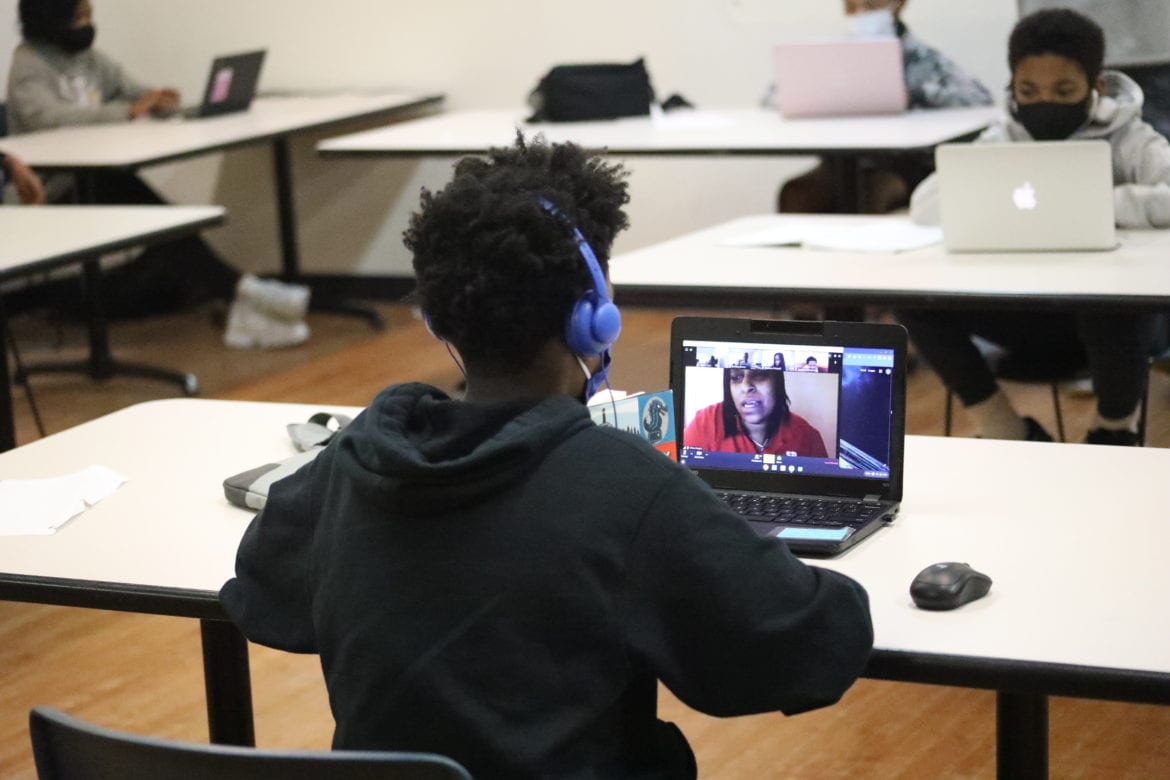Mississippi Today
Senate leader wants to fully fund public education for just the third time since 2003

Senate leader wants to fully fund public education for just the third time since 2003
Senate Education Committee Chairman Dennis DeBar, R-Leaksville, announced in a committee meeting Thursday that he wants to fully fund public schools this session through “minor” changes to the state's funding formula.
The funding formula used to allocate money to public schools, otherwise known as the Mississippi Adequate Education Program (MAEP), was established by the Legislature in 1997 and has been consistently underfunded every year since 2008. MAEP funding provides the state's share of funding for the basic operations of local school districts, ranging from teacher salaries to textbooks to utilities.
The Tuesday announcement from DeBar came as a surprise to some political observers since MAEP has been fully funded just twice since it was fully enacted in 2003. And it has been the subject of intense public, legal and legislative debate about the actual amount of money public schools need.
According to the Parents' Campaign, an education advocacy group, MAEP was underfunded by $273 million for the 2022-23 school year and by $3.3 billion since 2008. But still, it is generally the largest state expenditure each year. In the 2022 session, the Legislature appropriated $2.1 billion for MAEP.
DeBar made the comment during the Senate Education Committee's discussion of House Bill 1369, which would have adjusted the method of calculating the number of students in a school district for the purposes of school funding. The bill would switch to counting based on the number of students enrolled in the district instead of measuring student attendance.
The bill also contains other sections of the law that established the MAEP program, creating the possibility of modification to other aspects of the law before the session ends. The specific changes to the funding formula have not yet been introduced and most likely will not be finalized until the end of the session, when House and Senate leaders meet in conference committees to negotiate differences.
“We're bringing forth these code sections with the goal in mind to make some minor technical changes to the MAEP formula itself,” DeBar said. “The goal is to fully fund MAEP this year, and this is our vehicle to make it happen.”
The MAEP has consistently been the subject of fierce legislative debate. In the 2010s, both then-Lt. Gov. Tate Reeves, who is now governor, and House Speaker Philip Gunn proposed scrapping MAEP for a new formula. They argued MAEP was too expensive to fully fund. Others argued that the equity funding features of MAEP have helped less affluent districts by providing additional state funds for them, and that the goal should be to amend the formula and fully fund it. The proposal to scrap MAEP passed the House, but was surprisingly defeated in the Senate. It marks a rare instance where a proposal endorsed by both presiding officers was defeated.
Several Mississippi advocacy groups tried in 2015 to let voters take matters into their own hands through the ballot initiative process, proposing a vote on forcing lawmakers to fully fund MAEP each year. But before voters were given a chance to decide at the ballot boxes, lawmakers for the first time introduced an alternative initiative to go on the same ballot. The original initiative failed at the polls after much politicking and contentious public debate.
Efforts to fully fund the formula this legislative session come as the state is experiencing record revenue growth with a surplus heading into the 2023 session of nearly $4 billion, thanks in part to the economy being spurred by millions in federal COVID-19 relief funds.
Education advocates have said they are pleased by the move to fully fund MAEP, but are waiting to see what the changes to the funding formula are.
“We have trusted (Sen. DeBar) and he has proven himself to be trustworthy,” said Nancy Loome, executive director of the Parents' Campaign. “Our expectation is that it's not going to be anything that would be damaging to public schools, but we're going to wait and see.”
This article first appeared on Mississippi Today and is republished here under a Creative Commons license.
Mississippi Today
On this day in 1964
April 26, 1964

Civil rights activists started the Mississippi Freedom Democratic Party to challenge Mississippi's all-white regular delegation to the Democratic National Convention.
The regulars had already adopted this resolution: “We oppose, condemn and deplore the Civil Rights Act of 1964 … We believe in separation of the races in all phases of our society. It is our belief that the separation of the races is necessary for the peace and tranquility of all the people of Mississippi, and the continuing good relationship which has existed over the years.”
In reality, Black Mississippians had been victims of intimidation, harassment and violence for daring to try and vote as well as laws passed to disenfranchise them. As a result, by 1964, only 6% of Black Mississippians were permitted to vote. A year earlier, activists had run a mock election in which thousands of Black Mississippians showed they would vote if given an opportunity.
In August 1964, the Freedom Party decided to challenge the all-white delegation, saying they had been illegally elected in a segregated process and had no intention of supporting President Lyndon B. Johnson in the November election.
The prediction proved true, with White Mississippi Democrats overwhelmingly supporting Republican candidate Barry Goldwater, who opposed the Civil Rights Act. While the activists fell short of replacing the regulars, their courageous stand led to changes in both parties.
This article first appeared on Mississippi Today and is republished here under a Creative Commons license.
Mississippi Today
Lawmakers work to revive MAEP rewrite, PERS changes as session nears end
Lawmakers are working to revive a proposal to rewrite the long-standing Mississippi Adequate Education Program that provides the state's share of the basics to operate local school districts.
A resolution to revive the measure in the final days of this legislative session was passed by the Senate and is pending in the House.
The resolution also would revive an effort to strip away the power of the Public Employee Retirement System Board to increase the amount state and local governments contribute to Mississippi's government pension program. While stripping away the board's authority, the Legislature in the resolution would commit to infusing more cash into the retirement system.
The resolution, which is needed before either of the two pivotal issues can be taken up this late in the session, still must pass the House. Speaker Jason White, R-West, said the House could take up the resolution in the coming days.
White added that there is a possibility this legislative session, set to end within about a week, might be extended, which also would require a resolution. Such a resolution would not necessarily mean the Legislature stays in Jackson for additional days, but would give the option for the Legislature to recess and come back at a later date.
The Senate resolution that spelled out what would be in the new legislation included an objective funding formula to ascertain the amount of money needed to operate a school.
House leaders have been insistent on rewriting MAEP this session. Senate leaders were equally insistent that any rewrite of the school funding formula include an objective method of determining the base student cost – the amount of money provided to each school per student.
The original House bill did not include an objective formula. But the resolution does include such a formula. Any final bill passed based on the resolution could change the language in the resolution.
Senate Education Chairman Denis DeBar, R-Leakesville, said the proposed education funding compromise includes key elements from both the House and Senate plans.
“It has a major priority of the Senate – an objective funding formula,” he said. “The formula will give school districts predictability in terms of their funding levels.”
He said the formula would be easier for some to understand than MAEP.
Plus, DeBar said the formula would provide “weights” or additional funding to educate students who fall into specific categories, such as low income students. Providing additional funds for certain categories of students was a key proposal of the House,
On Thursday, House Education Chair Robertson, R-Starkville, said he was still studying the proposed education formula rewrite compromise, but said “we're close.”
The same resolution also includes language reviving issues concerning the state's massive Public Employees Retirement System. The language in the resolution, which again could be altered in the process, strips away the authority of the board that governs PERS to unilaterally increase the amount of money governmental entities, both state and local, pay into the public employee pension program.
Instead, the board, which consists primarily of people elected by public employees and retirees, could only make a recommendation to the Legislature to increase the amount governmental entities pay into the system.
An original House bill would have dissolved the existing PERS Board and replaced it with a board consisting primarily of political appointees. The House bill caused an uproar among members of PERS, which consists of about 365,000 current government employees, retirees and others who are eligible for benefits when they retire.
The Senate killed the House proposal, but later passed a measure stripping away a significant portion of the PERS Board's authority.
The issues surrounding PERS have come to the forefront this session after the board voted to increase by 5% over three years the amount government entities contribute toward the paycheck of each employee. Various agencies, especially city and county governments, complained they could not afford the increase that would require them to raise taxes and-or cut services.
The PERS Board said the increase is needed, based on recommendations of financial experts, to address a possible long-term funding shortfall facing the system. Some, though, argued the board overreacted based on a short-term financial snapshot of the system.
While stripping away the authority from the board, the resolution calls for the Legislature to provide PERS with an infusion of cash to offset the revenue loss by preventing the 2% increase in the employer contribution rate from being enacted. A 2% increase would cost state and local governments about $150 million.
In the resolution, the Legislature would commit to providing a .5% increase in the employer rate each year for five years. But it would be paid with state tax dollars by the Legislature instead of county and city governments and school districts.
The passage of the suspension resolution would indicate the House and Senate are close to agreement on two of the major issues facing the Legislature as the scheduled end of the 2024 session approaches.
The new formula for per-student funding from the state would be based on the average teacher's salary and number of students enrolled.
Then, the districts would get additional funds for administrative expenses, ancillary personnel and maintenance.
After that the schools would get a specified amount of additional funds in various categories, such as for special education students, low income students, non-English learners and other categories.
DeBar said under the proposed rewrite of MAEP, local schools would get about $220 million more than they received for the current fiscal year. That amount would be about $30 million less than the MAEP would have provided for the upcoming year if fully funded. The original House plan to rewrite MAEP would include an amount that was close to what MAEP would have generated if fully funded.
This article first appeared on Mississippi Today and is republished here under a Creative Commons license.
Mississippi Today
Senate negotiators a no-show for second meeting with House on Medicaid expansion
Senate leaders did not attend a second conference committee meeting with their House counterparts on Thursday to try and compromise on a final bill to expand Medicaid coverage to poor Mississippians.
House Medicaid Chairwoman Missy McGee, a Republican from Hattiesburg, said she was disappointed the three Senate negotiators didn't attend the meeting because she expected to hear an update on where the chamber stood on reaching a compromise.
“Those of you who are looking for information, so are we,” McGee said. “Just know the House stands ready to negotiate this very important issue. We are here at the Capitol, and we're hoping that we'll be able to have some conversations later today and later and in the final days of the session. Thank you for coming and sorry to have wasted your time.”
Senate Medicaid Chairman Kevin Blackwell, a Republican from Southaven who is one of the Senate negotiators, did not answer questions from reporters about the conference committee as he walked out of a separate Senate committee meeting. But he said the Senate was “working on a compromise.”
After the meeting, McGee told reporters she notified Blackwell on Wednesday that she was scheduling the second conference meeting for Thursday, but she was not sure if the senators would attend or not.
“I was hoping we were able to meet again, even if it was briefly,” McGee said. “I didn't hear anything from the Senate yesterday, so I was hoping we would be able to discuss today.”
The House and Senate are in negotiations on a final expansion bill because the two chambers earlier in the session passed vastly different proposals.
The House's initial plan aimed to expand health care coverage to upwards of 200,000 Mississippians, and accept $1 billion a year in federal money to cover it, as most other states have done.
The Senate, on the other hand, wanted a more restrictive program, to expand Medicaid to cover around 40,000 people, turn down the federal money, and require proof that recipients are working at least 30 hours a week.
The negotiators met publicly for the first time on Tuesday, but the six lawmakers remained far apart from a final deal.
The Senate simply asked the House to agree to its initial plan. But the House offered a compromise “hybrid” model that uses public and private insurance options to implement expansion. The Senate negotiators on Tuesday were mostly noncommittal on the hybrid compromise.
House leaders, such as Republican Rep. Sam Creekmore IV of New Albany, have said they are willing to compromise on a final plan with the Senate, but they want an agreement that covers people up to 138% of the federal poverty level to receive the full 90% matching rate from the federal government.
“Here we are with a chance to receive 90 cents on the dollar if we give 10 cents, and that's it,” Creekmore said. “I don't know of a business who would not take that. Yet we're going to turn that down? On the House side, we're not willing to turn that down.”
Lawmakers face a Monday deadline to file an initial compromise plan on Medicaid expansion, though that deadline could be suspended if two-thirds of the legislators in both chambers agree to suspend the deadline.
House Speaker Jason White, a Republican from West, told reporters he wished the Senate negotiators would have attended the Thursday meeting, but he's still optimistic the two chambers can agree on a final deal.
This article first appeared on Mississippi Today and is republished here under a Creative Commons license.
-
228Sports5 days ago
From Heartbreak to Hoop Dreams: Pascagoula Panthers Springboard from Semifinal Setback to College Courts
-
Mississippi News5 days ago
2 dead, 6 hurt in shooting at Memphis, Tennessee block party: police
-
Local News22 hours ago
Sister of Mississippi man who died after police pulled him from car rejects lawsuit settlement
-
Mississippi News5 days ago
Forest landowners can apply for federal emergency loans
-
Mississippi Today22 hours ago
At Lake High School in Scott County, the Un-Team will never be forgotten
-
Mississippi News7 days ago
Burnsville man arrested in Prentiss County on drug related charges
-
Mississippi News4 days ago
Cicadas expected to takeover north Mississippi counties soon
-
Mississippi News3 days ago
Viewers make allegations against Hatley teacher, school district releases statement – Home – WCBI TV



































